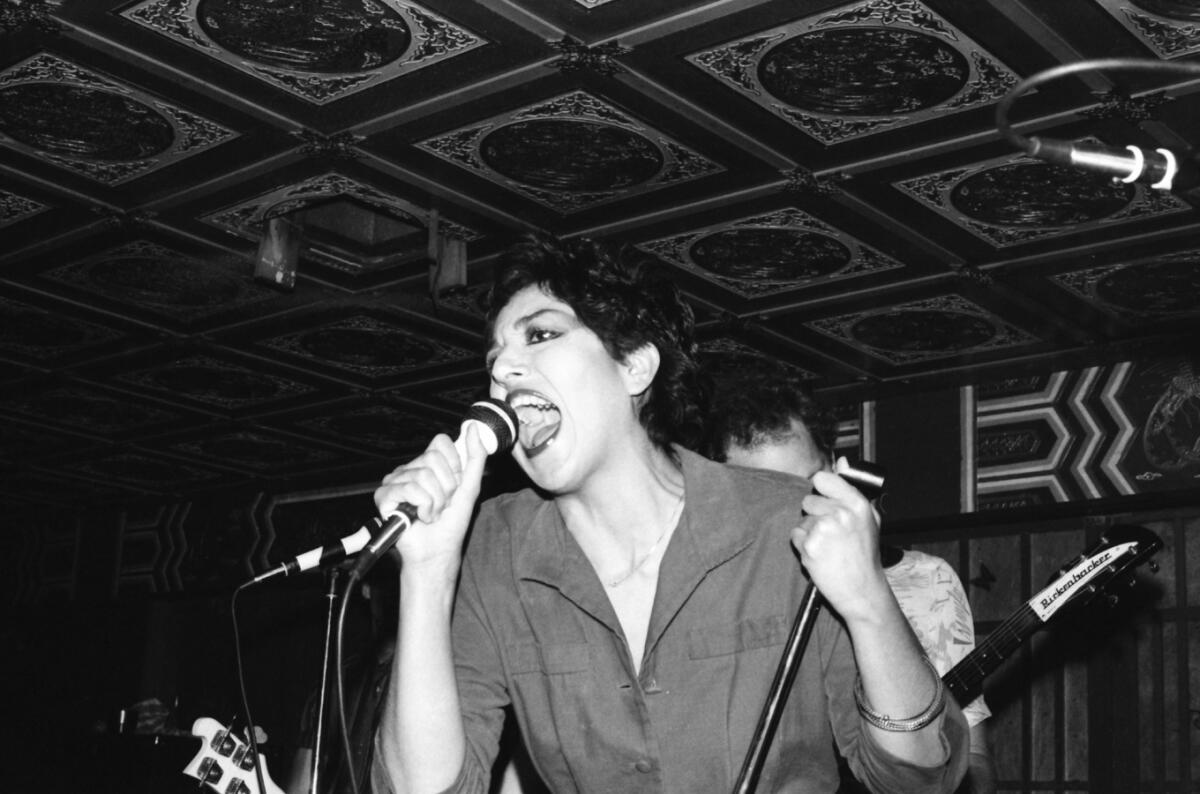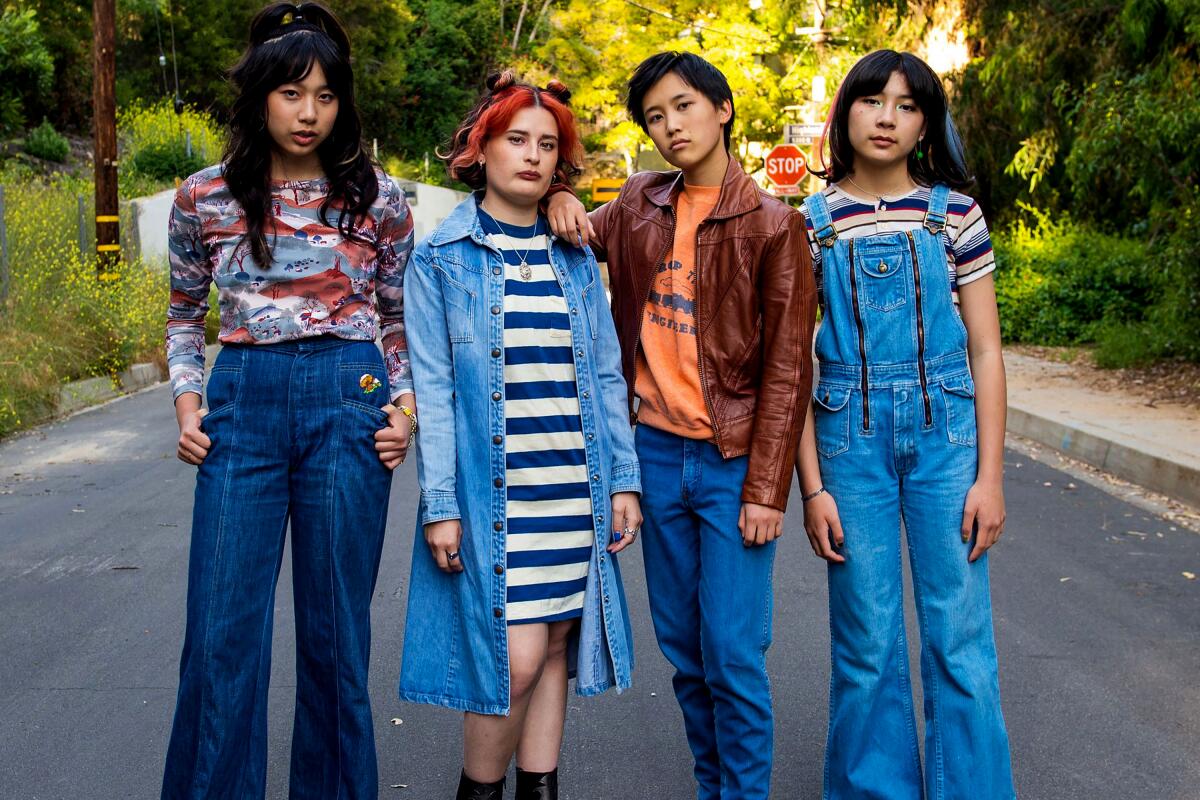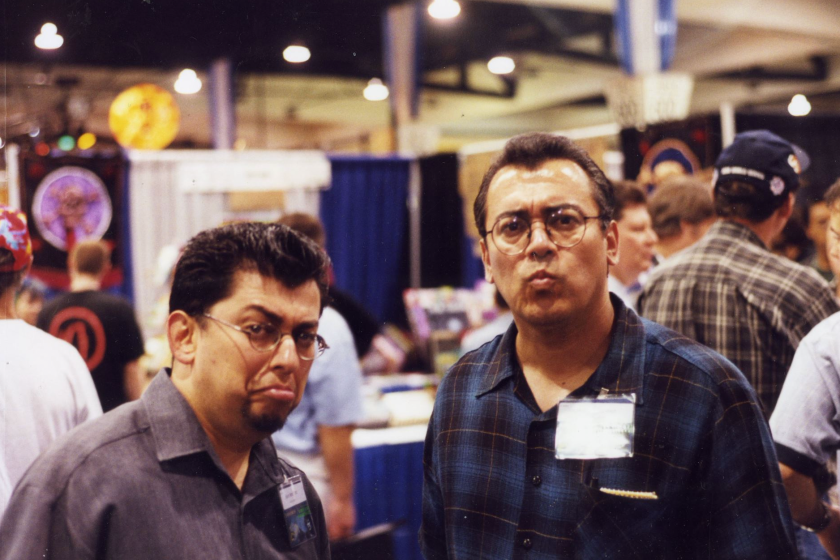‘Chinatown Punk Wars’ chronicles the heyday of L.A. punk and the clubs at the center of the scene

- Share via
The wonderful PBS SoCal/KCET series “Artbound” — which specializes in documentaries, historical and contemporary, on Southern California culture, from comic books to gospel music to ceramic dinnerware — opens its 14th season Wednesday with “Chinatown Punk Wars,” a look back to when Madame Wong’s and the Hong Kong Cafe faced each other across Chinatown’s Central Plaza like the Houses of Montague and Capulet on a stage set filled with new music fans.
So return with us now to those thrilling days of yesteryear, when hair was spiky and bands found themselves onstage almost before they formed. Angelenos of a certain age and persuasion may enjoy the trip back to the brief heyday of this trash-bag Camelot, while interested youngsters might learn how grandma pogoed back in the ‘70s.
“Wars” (it was unfortunately styled Won Ton Wars at the time) overstates the matter a bit; it was more psychological than a real rivalry, given that each club developed an individual audience and neither hurt for business — though the Hong Kong owners went in for pranks and Esther Wong could be doctrinaire about not booking bands that played the Hong Kong. Still, “wars” sells papers, and it is kind of a punk word.
Esther Wong, the unlikely “godmother of punk” who showcased such groups as Oingo Boingo at her Madame Wong’s clubs in Chinatown and Santa Monica in the late 1970s and ‘80s, has died.
The broader story, as enacted in cities and towns across the country and across the ocean, is quickly sketched: Popular music had gotten soft, overblown and corporate, serving a superstar system that put increasing distance between the people who made it and the people who consumed it; it had nothing to say to an audience looking for something less self-satisfied, less polite. Punk, among other contemporary movements, brought loud, fast original music into small, sweaty rooms, rewriting the rules of the business. Musicianship mattered less than desire, originality, energy — which isn’t to say that there weren’t musicians among them. You don’t have to look any farther than X, the ne plus ultra of L.A. punk bands, for proof of that.
An impressive roster of participants, journalists and historians — “Chinatown Punk Wars” happily does not omit the community to focus solely on the musicians and fans who squatted there for a few years — tell the tale. Commentators include director Penelope Spheeris, whose documentary “The Decline of Western Civilization” became the era’s video bible; writer Kristine McKenna, who was this newspaper’s main guide to the underground in those years; Gary Lachman, nom de punk Gary Valentine, formerly of Blondie and leader of the Know, who played Wong’s opening night and many nights thereafter; X’s John Doe, the punk Gary Cooper (many who have never heard his music might recognize from his role on “Roswell”).
Also: Alice Bag, of the Bags, one of the first of the first wave punk bands; Rudy Medina, from East L.A.’s The Brat (Chicano punk bands form a subset of the story); Black Flag co-founder Keith Morris; Dave Alvin of the Blasters, Carla Olson of the Textones; Minutemen (and later Stooges) bassist Mike Watt, who declares himself bummed never to have played the Hong Kong; and Mamie Hong Weinberg, whose father, Bill Hong, owned the restaurant above which the Hong Kong Cafe was established. As veterans often will, they look back with humor and perspective; they’re a charming, time-seasoned bunch. Most still make music, and a few are legends.
For the sake of critical transparency, I should note that I am acquainted with a few of these people, but none so well as Paul Greenstein, my best friend from high school (and later best man), who kicked off the Chinatown scene when, in 1978, he convinced George Wong to convince his wife Esther to let him put on shows one night a week at their second-story restaurant. A connoisseur of of the old city, with a genius for making friends with bartenders and shopkeepers and a talent for bringing to life whatever came into his mind, he had become a regular at Madame Wong’s quiet, ornate bar. “I was not in the music business, I was not a promoter,” he says here. “I was just a guy looking to do things.”
“Love and Rockets: The Great American Comic Book,” a new documentary airing on PBS’ “Artbound,” celebrates creators Gilbert and Jaime Hernandez
The quick success of Wong’s led, after not too long a while, a trio of entrepreneurs to open the Hong Kong Cafe just across the plaza. With Esther Wong unfriendly to bands that caused damage to the establishment that bore her name, the two clubs naturally sorted themselves into two camps. Madame Wong’s — Greenstein departed after four months over creative differences — featured a range of bands that might loosely be termed new wave (“Slightly lighter, but not necessarily vapid,” says Lachman), while the Hong Kong booked bands that might loosely be termed punk, insured by a system (born at the suggestion of the Germs’ Darby Crash) whereby any damages would be taken out of the band’s pay. “When there are minimal losses, it becomes a better working relationship,” admits Alice Bag, whose band was responsible for getting punk banned from Madame Wong’s.
If it necessarily leaves out a lot, “Chinatown Punk Wars” nevertheless provides a good primer to L.A.’s late ‘70s underground music scene and its rise and — not a fall, really, but a transition. Scenes are productive while they last, and they never last. As most observers agree, Los Angeles punk grew less fun with the arrival of a new more combative crowd, and the benign pogo gave way to the brutal slamdance. “The music was always aggressive,” says Doe, who had no time for being spit upon. “It was the audience that changed.”

Yet the most committed artists manage to stick around; players who keep playing become better players; amateurs grow into professionals — and some, who never make a career, keep at it for fun. X and the Go-Go’s and the Dickies all graduated to major labels. Pat Smear, from the calamitous Germs, was eventually recruited into Nirvana and the Foo Fighters. At the same time, punk as a style, a sound, an attitude, has had remarkable legs, underground and above it (Green Day took it to Broadway), providing an annuity for its founders and a gateway for new bands — the Linda Lindas, young, Asian and Latinx, who have partial roots in Chinatown, cap this telling. It’s long since gone global.
The Hong Kong Cafe closed its doors on the last night of 1980 (it was revived as a venue from 1992-95), while Madame Wong’s stayed in business for several more years, until a fire in 1986; a Santa Monica branch, Madame Wong’s West, carried on into the early ‘90s. While sometimes cast as a villain in this story, if you make punk rock the hero, and painted in her casually racist time as a “dragon lady,” “The Chinatown Punk Wars” gives Esther Wong her due. “She was a tough cookie,” says Lachman. “She knew what she wanted.” Says Alice Bag, whose band she barred from her club, “She was a businesswoman, and I respect that.”
More to Read
The complete guide to home viewing
Get Screen Gab for everything about the TV shows and streaming movies everyone’s talking about.
You may occasionally receive promotional content from the Los Angeles Times.








